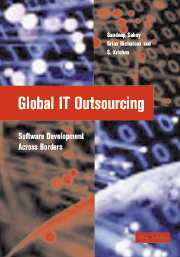Book contents
- Frontmatter
- Contents
- List of figures
- List of tables
- List of boxes
- Foreword
- Acknowledgements
- List of abbreviations
- 1 Introducing the phenomenon of global software work
- 2 Globalization and global software work
- 3 GlobTel's GSA programme in India
- 4 The GlobTel–Witech relationship: a ‘standardization’ perspective
- 5 Global software work: an identity perspective
- 6 The GlobTel–MCI relationship: the dialectics of space and place
- 7 Managing the knowledge transfer process: the case of Sierra and its Indian subsidiary
- 8 The case of Gowing and Eron GSA: power and control
- 9 Cross-cultural communication challenges: GSAs between Japanese and Indian firms
- 10 Reflections and synthesis on theoretical insights
- 11 Managerial implications
- Index
- References
4 - The GlobTel–Witech relationship: a ‘standardization’ perspective
Published online by Cambridge University Press: 14 January 2010
- Frontmatter
- Contents
- List of figures
- List of tables
- List of boxes
- Foreword
- Acknowledgements
- List of abbreviations
- 1 Introducing the phenomenon of global software work
- 2 Globalization and global software work
- 3 GlobTel's GSA programme in India
- 4 The GlobTel–Witech relationship: a ‘standardization’ perspective
- 5 Global software work: an identity perspective
- 6 The GlobTel–MCI relationship: the dialectics of space and place
- 7 Managing the knowledge transfer process: the case of Sierra and its Indian subsidiary
- 8 The case of Gowing and Eron GSA: power and control
- 9 Cross-cultural communication challenges: GSAs between Japanese and Indian firms
- 10 Reflections and synthesis on theoretical insights
- 11 Managerial implications
- Index
- References
Summary
Significance of standardization
In this chapter, we analyse the GlobTel–Witech GSA relationship using the perspective of standardization, which refers to the socio-technical processes through which various standards are implemented in organizations. The standardization perspective is significant since many firms with global operations base their strategy on the assumption that there are more similarities than differences in the world. Coordination of these global activities is then carried out through central control from headquarters, based on standardized products, processes and practices. Standardization becomes a key feature to build and sustain a relationship by homogenizing operations to the extent that the outsourcing and outsourced firms cannot be distinguished from each other. In software development, the role of standardization has in the past been discussed in the context of ‘internationalization’ of software packages (Taylor 1992; O'Donnel 1994). The purpose of internationalization is to develop and market packages in a ‘mass-production’ mode. The analysis of standards has not been conducted in the context of the processes by which GSW is carried out. Also, the role of standards in the internationalization of software has largely assumed that through appropriate language-translation strategies, effective global products can be developed and cultural differences taken into account. For example, Taylor (1992) writes:
The end goals of internationalisation, then, are to be able to have a sort of generic package, with an appendix or attachment that details all the cultural specifications.
(1992: 29)- Type
- Chapter
- Information
- Global IT OutsourcingSoftware Development across Borders, pp. 64 - 87Publisher: Cambridge University PressPrint publication year: 2003



